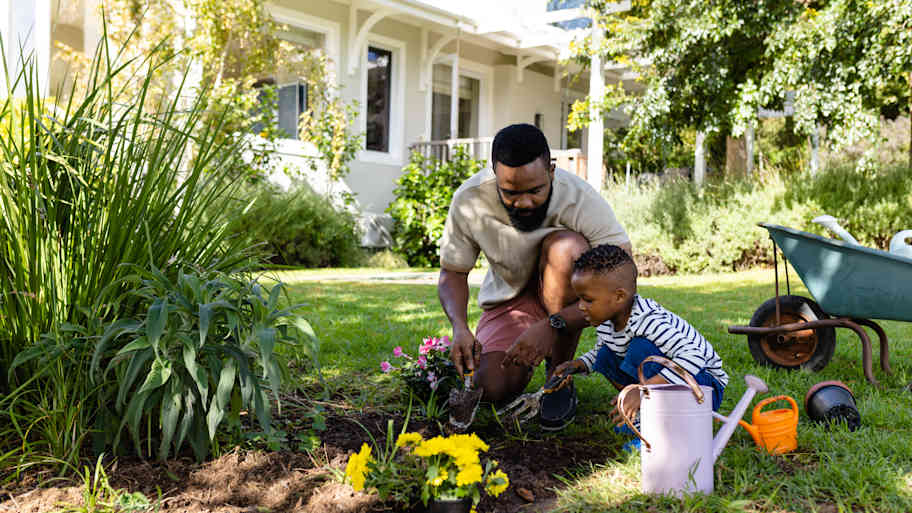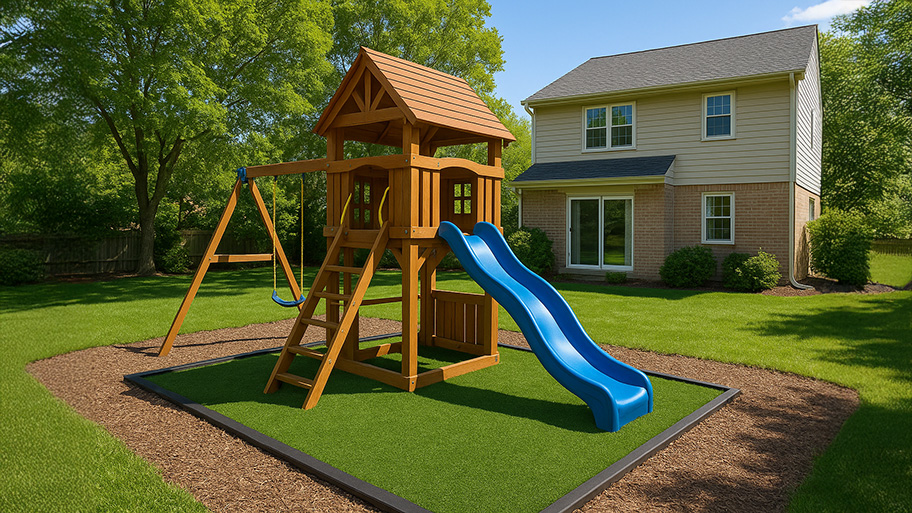
What are average sod installation prices? Learn how much sod costs in Dallas, TX, based on factors like square footage, land prep, land condition, and more.
Choose a licensed and insured landscaper with a proven track record and references


Not all landscapers are equal. Some will just carry out routine maintenance, while others will transform your entire yard into an entirely new outdoor space—whether you want a flowing backyard water feature or a paver patio. Regardless of the work you want done, always make sure to hire a landscaper who is licensed and insured to keep yourself protected. Once you confirm that, base your decision on references and how well their services meet your needs.
Landscapers can perform a wide variety of services on your property, from routine maintenance to installing high-end features like ponds and paver patios. It’s important to find one who specializes in the type of work you’re looking for. Some common services landscapers perform include the following:
Maintenance care: Some landscapers specialize in lawn upkeep and maintenance, including regular mowing, trimming, and pruning, as well as seasonal leaf clean-up. These pros might not offer more intensive landscaping renovations or design services.
Hardscaping: Landscapers who offer hardscaping install patios, walkways, retention walls, and other features that involve the use of concrete, rock, or brick. Hardscaping costs can vary based on the scope of the project and the feature(s) being built.
Xeriscaping: Xeriscaping is a landscaping specialty that involves designing and installing landscaping that uses little to no water for maintenance. While the cost of xeriscaping can be high initially, you’ll often save on water and maintenance over time.
Lawn health: Many landscapers also offer services to improve and maintain the health of your lawn through fertilization, pest control, weed control, and nutrient amendments.
Tree care: Some landscapers specialize in tree care, including pruning, maintaining tree health, and tree removal. A professional landscaping company might even have a certified arborist on staff to handle tree care.
Irrigation: For yards with irrigation needs, look for a landscaper who designs, installs, and services sprinklers and other irrigation systems. The complexity of these systems often requires specialized service and might demand that the landscaper have a certified plumber on staff.
Landscape design: If you’re looking for a fresh start for your yard, a landscape designer can create the property of your dreams, from hardscaping features to regrading the lawn to the plants that’ll be used.

Knowing how to hire a landscape contractor that’s the right fit for the job requires some careful planning. Before you reach out to a local landscaping service, have a clear picture of your project and dig into your contractor’s references and qualifications.
No two landscaping projects are alike. You may only need a landscape contractor who will mow your lawn once a week, which will demand a different kind of landscaper than if you want to install new walkways, patios, garden beds, and ponds. For a more extensive one-off project, you might need a landscaper with a landscaping architect on staff. These services have vastly different costs and qualifications. Knowing what services you want will help you get an accurate quote and understand which type of landscape contractor to hire.
There’s a massive range in the average cost of landscaping, primarily based on the expertise of the professional and the services you need. Simple maintenance like lawn mowing or yard dethatching can cost as little as $100. Totally redoing your landscaping with the help of a landscape designer or landscape architect could cost more than $6,800.
Your landscaping contractor will be able to help you understand what’s possible with your budget, but it’s a good idea to have a budget in mind before you even begin reaching out to professionals. Then, you can share your landscaping ideas and budget to rule out professionals who won’t be able to meet your expectations.
Landscape contractors have different areas of expertise, but all qualified professionals will be bonded, insured, and have the required licenses—usually just a landscaping contractor’s license if anything, but every state’s licensing requirements are different. Aside from a general landscaping contractor’s license, your landscaper may need:
An arborist license (for working with trees)
A landscape horticulturist license (for mulch, grass, small plants, and bushes)
A license in a specific category, such as interior landscaping or irrigation systems
A license or certificate to apply pesticides and fertilizer
Even if your contractor doesn’t need a license, they may have certain professional certifications from the National Association of Landscape Professionals (NALP) or the Professional Landcare Network (PLANET). This certainly helps prove their skillset, but you’ll still need to check references and read through online reviews.
You want to find the best landscaper at the best value, which means you’ll need to shop around to see what’s available in your area. Interview at least three professionals to get a feel for the market and understand typical pricing. If one quote is significantly higher or lower than the others, something’s off, and you can rule it out as a possibility.
Want to weed out scammers or contractors likely to go bust before they complete your project? Ask for a background check. A background check will turn up red flags in a company’s credit and legal history. It’s also a good idea to scan online reviews for complaints, too.
Don’t start your project without a contract and payment plan that is clearly outlined in writing and signed by both parties. The contract serves as a legally binding guideline and ensures that both parties hold up their end of the deal. It also helps prevent surprise expenses. Basically, what you see in the contract should be what you get.
Things to look for in your contract include the following:
The scope and details of the project
A cost breakdown and total project cost
Specific information about materials your contractor will use, including color, brand, and quantity
A clear breakdown of the services your contractor will provide
What, if anything, you’re responsible for throughout the project
Specifics for timeline
The approval process for additional work or costs
Information on warranty coverage and satisfaction guarantees
While you’re interviewing different landscapers, it’s important to ask questions to get a feel for their experience and see their plans for your project. Nobody wants to find themselves in a situation where an unqualified arborist plants a sick tree that dies shortly after the project wraps up, or you end up hiring an inexperienced landscaper who makes common landscaping mistakes. Here are eight questions to ask your landscaper to vet them before you hire:
What type of services does your company offer?
Are you bonded and insured?
How long have you been working on these types of projects?
Do you have specialists who can complete my project?
Will you be the one to complete my project, or will you subcontract the work?
Can I have a copy of the plans?
What kind of guarantee do you offer?
Can I speak to some references?
If you’ve gathered up a few possibilities for landscaping contractors in your area but aren’t sure which one to choose, there are a few tips to make your decision easier. First, rule out any professionals who aren’t licensed and insured and those who don’t have the necessary specialists on staff to get your project done correctly. Get estimates from each pro remaining on your shortlist.
When comparing estimates from local landscapers, consider how well each one fits into your budget, and make sure they’re apples-to-apples, meaning they call for the exact same work with the exact same materials. If the portfolio or references from one landscaper impresses you more than the others, move forward with that pro. If not, you can choose based on cost.
Once the job is complete, there are a few things you should do:
Ensure that you make the final payment on schedule.
Document any follow-up instructions on what you need to know about the work they’ve done.
Set up a maintenance schedule with the company if you plan to have them perform any upkeep services.
Verify with the landscaper how to get in touch with them in case you have questions or problems in the future.
If you’re satisfied with the work, write an online review and offer to act as a reference for potential clients.
From average costs to expert advice, get all the answers you need to get your job done.

What are average sod installation prices? Learn how much sod costs in Dallas, TX, based on factors like square footage, land prep, land condition, and more.

Looking to step up your golf game without leaving your property? This guide details backyard putting green costs to help you decide if this project is worth it.

Leveling your yard can help with drainage and prevent damage to your home. Learn the cost to level a yard in Dallas, TX and what factors can affect the price.

While similar, comparing dirt versus soil comes down to what's inside the material, its usefulness, and how it performs, depending on how you intend to use it.

Artificial grass can enhance your home’s curb appeal with very little upkeep. Learn how to choose the artificial grass that’s right for your yard.

Bird poop on outdoor furniture is a common homeowner problem. Use our guide to help you remove these unsightly stains and clean up your property.